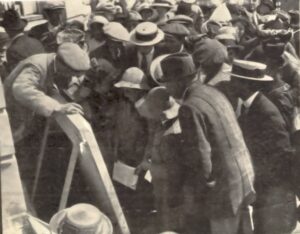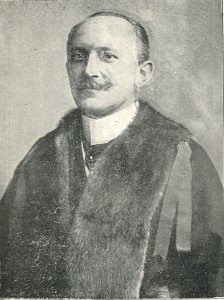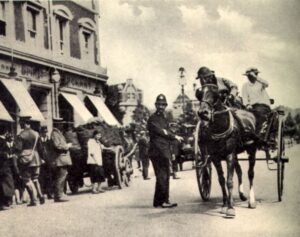
Before the First World War, Bexhill was a popular Edwardian resort inspired by continental elegance and attracted visitors and residents from all corners of the world.
German bands performed at the Kursaal , local hotels employed foreign staff, the Du Mont’s from Cologne were living in the Manor House and the nephew of Kaiser Wilhelm II, attended the Deutshes Paedagogium School for German Boys in Bexhill. Following the outbreak of the war in August 1914 the exodus of foreign workers and residents and the loss of visitors caused such a significant impact on the town that the manager of the Sackville Hotel, Harold Clarke, claimed “the war is killing the season!”
Despite Harold Clarke’s initial concerns the town carried on as much as normal throughout the war and there was no direct contact with the enemy. In some ways the war was actually a good thing for the town as in 1915 the resort enjoyed a record tourist season as holiday makers who would have usually travelled to the Continent and areas which had become battlefields chose to visit Bexhill instead. The Bexhill Observer reported,
“Not in the memory of residents since Bexhill became a fashionable resort has our town enjoyed such crowds of visitors as have been experienced through August”.
Germans, Spies and Secret Agents
Although Bexhill was a long way from the Frontlines and in many ways was untouched by the war, the influences of the war were never far away. Anti-German feelings began to grow and the once “Germanised” town became increasingly obsessed with tales of German spies and secret agents and became distrusting of most foreigners. On the 22nd October 1914, the enemy aliens who remained in Bexhill, Battle and Rye and who had registered under the Aliens Registration Act 1914 were rounded up by police and sent to an internment camp in Surrey. Due to anti-German feelings many had struggled to find work or accommodation since the outbreak of the war, so were relieved to finally have a safe place to stay.
Town Mayor Resigns
 In October 1914 the town Mayor, Daniel Mayer was forced to resign his position. He had been the Mayor for four years and although originally from Germany, he had been a naturalised British Subject for the past twenty years. Although he did not give details at the time, he claimed he was resigning due to “certain unfortunate incidents” which had occurred with certain other councillors. Mayer added,
In October 1914 the town Mayor, Daniel Mayer was forced to resign his position. He had been the Mayor for four years and although originally from Germany, he had been a naturalised British Subject for the past twenty years. Although he did not give details at the time, he claimed he was resigning due to “certain unfortunate incidents” which had occurred with certain other councillors. Mayer added,
“I am assured there is no personal feeling against me. .. I know, however, there is a feeling with some in the town that at this particular crisis they would have wished that a British-born subject should be at their head”.
The following year the Bexhill Observer reported Mayer had taken legal action against fellow councillor Mr. J. M Glover for writing several letters and giving speeches in the early weeks of the War, which were reported in the local newspapers where he made serious allegations against Mayer. In the letters he accused Mayer of working for the benefit of the Germans and prevented any form of patriotic displays in the town. These accusations were completely unfounded and Glover apologised, withdrawing all his comments about Mayer.

The Homefront
Many British people responded to the outbreak of War with panic buying and food hoarding. In Bexhill panic buying was so severe there were bread shortages during the first few weeks of the War. Housewives were encouraged to be economical in their use of food when preparing meals and to buy locally grown food whenever possible. At the time Britain was importing up to two thirds of her food supply, mainly from America and Canada. The unrestricted submarine warfare introduced by Germany in 1917 against merchant shipping and supply ships had a devastating effect on British food supplies, causing food shortages which in turn cased massive price increases.
To combat these shortages, the government encouraged people to use any spare land they could find to grow their own fruit and vegetables. Land owners were also required to give up land for farming. In the Bexhill Observer a local committee of gardeners requested donations of land to be turned into allotments and offered tips and advice for people wanting to grow their own vegetables. To further help win the war against food shortages rationing was introduced for the first time in January 1918. Sugar was the first to be rationed and by April was joined by meat, butter, cheese and margarine. Ration cards were issued to households and everyone had to register with a butcher and a grocer. With rationing, growing their own vegetables and the introduction of the convoy system to protect merchant shipping, Britain avoided starvation.
For Bexhill’s homefront the war was never far away. As well as dealing with the men going to War and many returning wounded or receiving the terrible news that their man had died, the town also lost most of its horses in the early months of the war, which caused many problems for local businesses and farms. Troops from Cooden Camp were also a regular sight in the town, while wounded soldiers in their blue uniforms helped to run the renamed St. Georges Cinema. The Kursaal was also renamed following accusations in the national press that Bexhill has an entertainment building with a German name. It became the Pavilion instead. War ship were often spotted sailing past, a Zeppelin was sighted in 1916 on its way to a bombing raid and many residents reported it was sometime possible to hear the rumble of shell fire from France while walking along the seafront.

